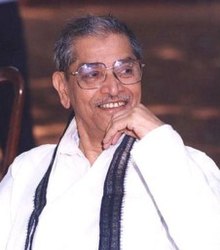Pandurang Shastri Athavale
| Pandurang Shastri Athavale | |
|---|---|

Pandurang Shastri Athavale
|
|
| Born |
19 October 1920 Roha, Maharashtra, India |
| Died | 25 October 2003 (aged 83) Mumbai, Maharashtra, India |
| Other names | Dadaji |
| Occupation | Activist Philosopher, Spiritual Teacher, Spiritual Leader |
| Spouse(s) | Nirmala Tai |
| Parent(s) | Vaijnath Shastri Athavale |
Pandurang Shastri Athavale (19 October 1920 – 25 October 2003), also known as Dadaji, which literally translates as "elder brother" in Marathi, was an Indian activist philosopher, spiritual leader, social revolutionary and religion reformist, who founded the Swadhyaya Parivar (Swadhyaya Family) in 1954.Swadhyaya is a self-study process based on the Bhagavad Gita which has spread across nearly 100,000 villages in India, with over 120 million adherents. He was also noted for his discourses on the Bhagavad Gita, the Vedas and the Upanishads.
Pandurang Vaijnath Athavale was born on 19 October 1920 in the village of Roha in Maharashra (konkan) India. He was one of five children born to the Sanskrit teacher Vaijanath Athavale and his wife Parvati Athavale.
When Athavale was twelve years old, his grandfather set up an independent course of study for the young boy. Thus, Athavale was taught in a system very similar to that of the Tapovan system of ancient India. In 1942, he started to give discourses at the Srimad Bhagavad Gita Pathshala, a center set up by his father in 1926.
Athavale read diligently in the Royal Asiatic Library for a period of 14 years; at a young age, he was well-known to have read every piece of non-fiction literature (ranging from Marx's philosophy to Whitehead's writings to ancient Indian philosophy). In 1954, he attended the Second World Philosophers' Conference, held in Japan. There, Athavale presented the concepts of Vedic ideals and the teachings of the Bhagavad Gita. Many participants were impressed by his ideas but wanted evidence of such ideals being put into practice in India. Nobel Prize–winning physicist Dr. Arthur Holly Compton was particularly enchanted with Athavale's ideas and offered him a lucrative opportunity in the United States, where he could spread his ideas. Athavale politely declined, saying that he had much to accomplish in his native India, where he planned to demonstrate to the world a model community peacefully practicing and spreading Vedic thoughts and the message of the Bhagavad Gita.
Swadhyaya is a process based upon Vedic philosophy, and the members of the Swadhyaya Parivar are called "Swadhyayees". Over the years, Rev. Athavale's followers (Swadhyayees) have taken the Bhagawad Gita's Message of the Indwelling God and God's love for all, to millions of people: transcending caste, social, and economic barriers. Rev. Athavale personally visited tens of thousands of villages (on foot and rented bicycles), and his adherents have followed suit to roughly 100,000 villages across India, and at least 34 nations across the globe. In these villages, Rev. Athavale started various experiments (Prayogs) to impart social activism by means of a god-centric devotion to the downtrodden, including cooperative farming, fishing and tree-planting projects in the spirit of collective, divine work (bhakti). Swadhyayees aim to fulfill Rev. Athavale's vision of eradicating the world's problems by creating a global family united under the principle of a universal blood maker. This can happen by taking the message of the Bhagavad Gita to every corner of the globe. Today, Swadhyaya has spread to numerous countries in the Caribbean, Americas, Asia, Europe, Australia, New Zealand, Middle East and Africa. The divine family (pariwar), has extended to many millions. Per Rev. Athavale's vision, Swadhyaya aims to create "Universal Brotherhood under the Divine Fatherhood of God."
...
Wikipedia
